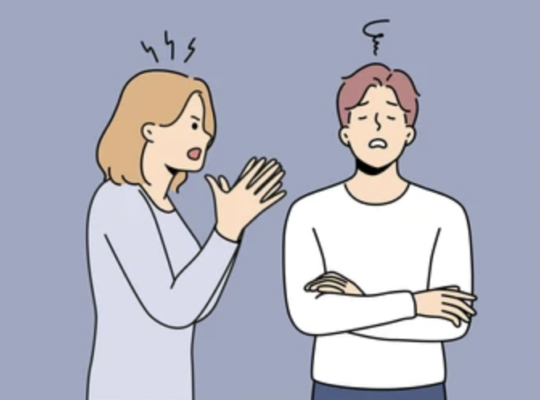“I feel sad all the time. Nothing makes me feel better.”
“I can’t make myself do much work. I’m just getting through the day.”
“I don’t enjoy things like I used to.”
“Everything feels like it’s falling apart. It feels hopeless.”
“I feel like something is wrong with me. Nobody will want to be around me.”
“I don’t think things will ever get better.”
These are common thoughts of people who are going through depression. When someone is depressed, their way of thinking changes. They might feel like they’re failing, even if they’re good parents or workers.
The main sign of depression is feeling very sad. A person with depression might cry a lot, even if nothing sad is happening. Or they might feel too sad to cry when something sad happens.
People with depression might have trouble sleeping and eating. They often feel tired all the time and find it hard to concentrate or make decisions. Some might even think about ending their life if their depression is really bad.
People with depression often see themselves in a negative way. They might feel worthless or unloved. They lose interest in things they used to enjoy and feel pessimistic about the future.
Sometimes, people with depression don’t feel sad. Instead, they feel numb and don’t enjoy anything. They might also have physical pains or use alcohol or drugs to cope. When kids start struggling at school for a long time, it could also mean they’re depressed.
Recognizing Your Thoughts Automatically
Do you know how to help yourself when you feel sad or down? Figuring out what you’re thinking is an important step in feeling better when you’re depressed. We start by helping you notice when your mood gets worse or you start thinking negatively. You might also notice behaviors like avoiding things or doing things that don’t help, like eating too much or sleeping too long. When you notice your mood getting worse or when you’re doing something that doesn’t help, we suggest asking yourself this question: “What was I just thinking about?”
This question helps you figure out your own automatic, unhelpful thoughts. Pay close attention to thoughts that stop you from doing things that matter to you. People without depression might have similar thoughts, but they usually know they’re just thoughts and not true. People with depression often believe these negative thoughts without questioning them.
Errors in Thinking
People with depression often make the same thinking mistakes. Recognizing and naming these mistakes can help you see things differently. For example, let’s say you really care about helping your family. Sometimes you might not be able to help your grandchildren, but that doesn’t mean you’re a failure as a grandparent. Here are some common thinking mistakes:
- All-or-nothing thinking: You see things as either perfect or terrible, with no middle ground. For example: “If I’m not the best, I’m the worst.”
- Catastrophizing: You imagine the worst possible outcome without considering other possibilities. For example: “I’ll be so upset, I won’t enjoy anything.”
- Disqualifying the positive: You ignore the good things that happen. For example: “I did well on this project, but that doesn’t mean I’m good at my job.”
- Emotional reasoning: You believe something is true because it feels true. For example: “I feel like I’m bad at my job, so I must be.”
- Labeling: You give yourself or others a harsh label without considering other factors. For example: “I’m a complete failure.”
- Magnification/minimization: You focus on the bad things and ignore the good things. For example: “Getting a B on this test means I’m stupid.”
- Mental Filter: You focus too much on one bad thing instead of looking at everything. For example, if you get one bad comment on a report full of good ones, you might think you’re not doing well at all.
- Mind reading: You think you know what people are thinking without considering other possibilities. Like thinking people believe you don’t know what you’re doing.
- Overgeneralization: You make big negative conclusions from small things. For instance, feeling uncomfortable in one meeting makes you think you’re not fit for the job.
- Personalization: You think people act negatively because of you, without thinking of other reasons. For example, thinking your neighbor didn’t say hi because you upset them.
- “Should” and “must” statements: You have strict ideas about how you and others should act. For instance, believing you can’t make any mistakes.
- Tunnel Vision: You only see the bad parts of a situation. For example, saying the whole day was terrible even though you felt good when you got dressed, cleaned up, went for a walk, and talked to a friend.
Addressing Automatic Thoughts
When we feel sad or upset, we often blame the situations happening in our lives. But it’s not just what’s happening that makes us feel this way. Our feelings come from how we think about what’s happening.
Think about a time when something upset you. Consider:
- What was happening?
- What were you thinking?
- How did you feel?
Most of the time, we only notice how we feel. For instance, if you texted a friend and they didn’t reply, you might think, “They don’t want to be with me anymore.” This thought could make you feel sad and worried.
Once you understand what you’re thinking, your feelings start to make sense.
Questioning Using the Socratic Method
Socratic questioning asking yourself some important questions when you feel sad, upset, or doing something that doesn’t help. These questions help you think more clearly and feel better. First, ask yourself what you were thinking. Then, ask:
- Why do I think this thought is true? Is there any proof it might not be true?
- Can I see this situation in a different way?
- If the worst happens, what can I do? What’s the best that could happen? What’s most likely to happen?
- How does believing this thought affect me? What might change if I think differently?
- What advice would I give to a friend in the same situation?
- What can I do about this now?
Getting Back on Track
To start feeling better when you’re feeling down, it’s important to do things that make you feel good. Many times, when people feel depressed, they stop doing things they used to enjoy. They might sleep too much, not exercise, or avoid activities altogether. They might think they won’t enjoy the things they used to like before. They might worry that others will notice something’s wrong.
Avoiding activities and not doing much can make you feel worse. You might start thinking negative things about yourself, like you’re lazy or unlikeable. This negative thinking and lack of activity can make depression worse. It becomes a cycle.
Being more active and giving yourself credit for trying can help you feel better. Making a schedule of activities is important. You should think about what you enjoy and what’s important to you. This can help you pick activities that make you happy and feel meaningful.
Once you know what’s important to you, it can motivate you to start doing things again. For example, if family is important to you, spending time with them might motivate you to get moving.
To start feeling better when you’re feeling down, it’s important to do things that make you feel good. Many times, when people feel depressed, they stop doing things they used to enjoy. They might sleep too much, not exercise, or avoid activities altogether. They might think they won’t enjoy the things they used to like before. They might worry that others will notice something’s wrong.
Avoiding activities and not doing much can make you feel worse. You might start thinking negative things about yourself, like you’re lazy or unlikeable. This negative thinking and lack of activity can make depression worse. It becomes a cycle.
Being more active and giving yourself credit for trying can help you feel better. Making a schedule of activities is important. You should think about what you enjoy and what’s important to you. This can help you pick activities that make you happy and feel meaningful.
Once you know what’s important to you, it can motivate you to start doing things again. For example, if family is important to you, spending time with them might motivate you to get moving.







